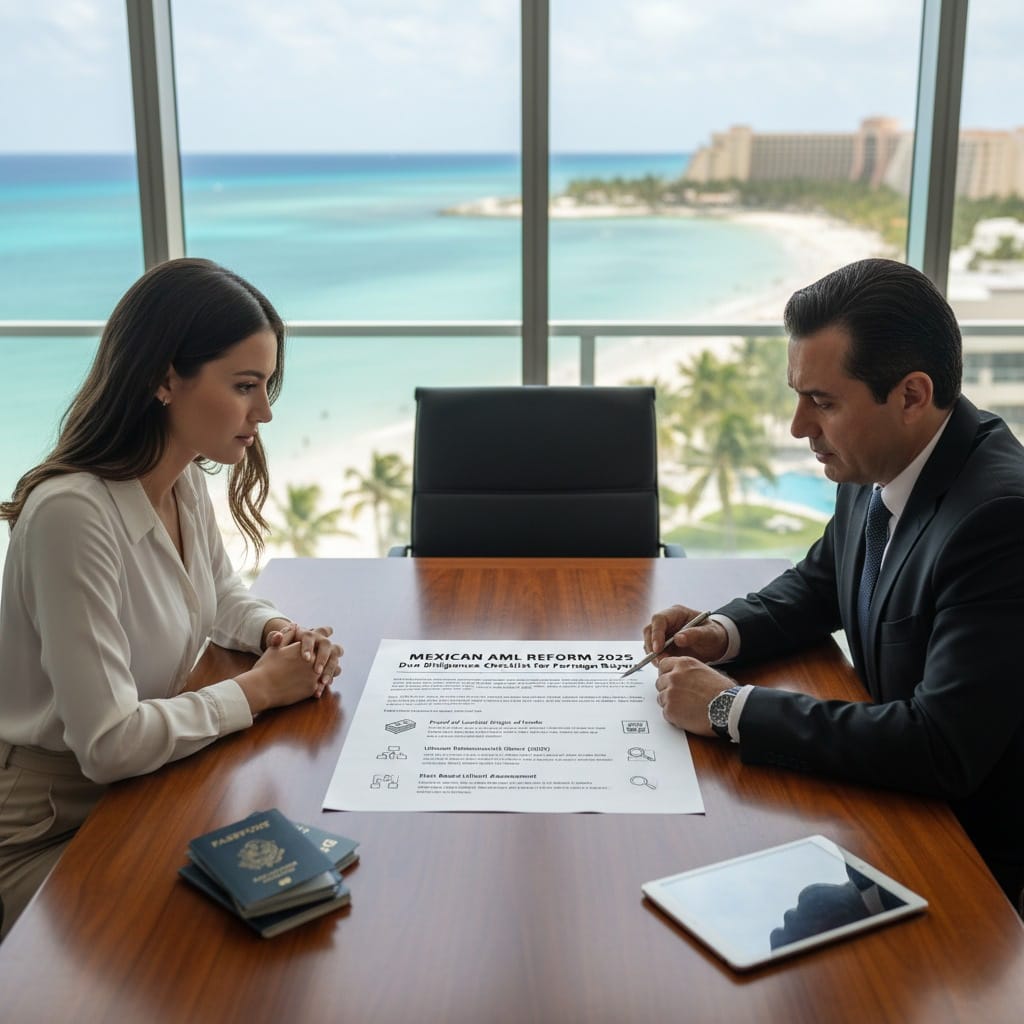How Mexico’s 2025 AML Reform for Real Estate Affects Your Purchase
Understanding the new anti-money laundering rules is crucial for foreign buyers. Here’s what you need to know about Mexico’s 2025 AML reform for real estate.
Investing in a property in the Riviera Maya is an exciting venture. Places like Tulum, Playa del Carmen, and Mérida offer incredible opportunities. However, the legal landscape for these investments is changing. In June 2025, Mexico approved a major reform to its Anti-Money Laundering (AML) law. This new law, known as the LFPIORPI, brings significant changes for foreign real estate buyers.
This reform creates a new standard of transparency in the market. It aims to protect the financial system and make investments more secure. As a result, every transaction will now face a much higher level of scrutiny. For you, the foreign buyer, this means being prepared for a more in-depth due diligence process. Understanding these changes is the first step to protecting your investment and ensuring a smooth purchase. This guide will break down what Mexico’s 2025 AML reform for real estate means for you in simple, clear terms.
A New Era of Transparency in Mexican Real Estate
You might be wondering why these changes are happening now. The main reason is that Mexico is aligning its laws with global standards. The Financial Action Task Force (FATF), an international body that sets policies to combat money laundering, has made recommendations for Mexico to strengthen its framework. This reform is a direct response to those recommendations. By making these updates, Mexico demonstrates a strong commitment to fighting illicit financial activities.
Furthermore, this alignment helps protect and strengthen the integrity of the Mexican real estate market. For legitimate investors, this is good news. A more transparent market is a safer market. It fosters greater confidence among high-quality international investors and promotes more sustainable growth in the long run. The new law moves away from a simple reporting system to a proactive and preventive regime. This requires constant vigilance and risk management from everyone involved in a transaction, ensuring your investment is built on a solid, legal foundation.
Your New Due Diligence Checklist
As a foreign buyer, the burden of compliance will heavily involve you. Your ability to provide clear and timely documentation is now more critical than ever. Developers and notaries will require more information to comply with the law. You should be prepared for a deeper inquiry into your finances and background. Here are the key things you will need to provide.
First, you must show proof of the lawful origin of your funds. Simply showing a bank transfer is no longer enough. You will need to present supporting documents that clearly explain where the money for the purchase came from. For example, this could include tax returns from your home country, historical bank statements, contracts from the sale of another property, or letters from an employer verifying a bonus.
Second, you must be transparent about the ultimate Beneficial Owner (BO) of the property. The new law is designed to pierce the veil of complex corporate structures or trusts. The idea that you can buy property anonymously through these vehicles is now obsolete. The ownership threshold for determining control of a company has been lowered to 25%. As a result, you will need to provide documents, such as shareholder registers or trust agreements, to identify the actual person who owns and controls the investment.
Finally, expect more questions about your background. The new law mandates a “Risk-Based Approach” for all transactions. This means developers and notaries must now classify their clients into risk categories (e.g., low, medium, or high). They will consider factors like your nationality, your profession, and whether you are a Politically Exposed Person (PEP). A PEP is someone who holds or has held a prominent public function. You will likely have to sign a formal declaration about your PEP status.
The Strengthened Role of Developers and Notaries
The reform also places significant new responsibilities on real estate developers and notaries. Understanding their new roles will help you see why the process has become more rigorous. Real estate developers are now explicitly designated as an “obligated entity” under the AML law. This is a profound change that eliminates any gray areas. It means every developer must now implement a complete and functional AML compliance program. This is no longer a simple transactional task but a continuous requirement for them to operate.
In addition, notaries, who have always been a critical control point, now have a greatly strengthened role. The law has reduced the monetary thresholds for reporting transactions to the authorities. For example, the threshold for reporting the creation of real rights over property has been cut in half, from 16,000 to 8,000 UMAs. This means a much larger volume of mid-range deals will now be formally reported. As a result, notaries will be extremely risk-averse and act as a much stricter filter. They will demand an impeccable and exhaustive client file before agreeing to formalize a deed.
Navigating Mexico’s 2025 AML Reform for Real Estate Successfully
While these new rules add more steps to the buying process, they do not need to be a barrier. With the right preparation, you can navigate them smoothly. The key is to be proactive and organized. Start gathering your financial documentation as early as possible. This includes tax returns, bank statements showing the accumulation of funds, and any other papers that create a clear “paper trail” for your investment capital.
Above all, work with a legal team that specializes in foreign investment and understands the nuances of this new reform. An expert advisor can guide you on exactly what documentation you will need. They can also help you prepare your compliance file to meet the strict standards of developers and notaries. This preparation is now just as important as your financial capacity to make the purchase.
The 2025 AML reform marks a new chapter for real estate in Mexico. It brings more scrutiny, but it also creates a safer and more transparent environment for everyone. For foreign investors, success in this new landscape depends on being prepared. By understanding the requirements and working with experienced professionals, you can confidently navigate the process and protect your slice of paradise.
Facing a real estate purchase or dispute in the Riviera Maya? Don’t navigate it alone. Contact PeninsuLawyers to protect your investment and secure your property rights.



